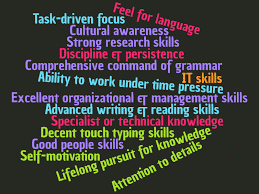
Are you someone who would love to be a translator and you are wondering what qualities you must possess and how you should carry yourself? Look no further because in this article we will look exactly into that. Just like any other profession, there are specific qualities that employees should possess and those are the qualities common across the board regardless of where you work. Some qualities are more obvious than others, but it’s good to note that there are specific qualities specific to good translators.
For example, impeccable references and a good reputation are as important as they would be in any other respectable profession. However, there are some personal qualities that might not associable with the translation industry in particular, which are just as indispensable.
1. Language Skills
Can you imagine having to read content that has grammatical errors, shorter sentences or sentences that make little sense? This is usually because of a translator who’s not well versed with the languages he or she is working with. That’s why it is very important for a translator to have impeccable language skills to avoid such cases.
However, linguistic expertise goes beyond just words on a page. It requires full and comprehensive mastery of both the source and target language. It is no use a translator being a walking, talking dictionary if their grammar and spelling skills are highly unsatisfactory.
2. Accreditation
We have all heard of cases where people lie about their credentials to get a particular job that they are eyeing. The problem with this is that employers end up using people who really have no capacity to carry out the tasks at hand. People will always blow their own horn and say how good they are at something when in reality it’s the absolute opposite. Therefore, while a professional reference can be useful, one of the best ways to ensure a translator is of the highest quality is by looking if they have certifications from accreditation schemes or bodies.
For example, in the UK, the Institute of Translation and Interpreting or the Institute of Chartered Linguists are two such organizations, while there are others both in the US and Europe.
3. Experience
This is another important quality for a highly valued professional in any industry. Having a prior engagement with the duties at hand is usually a plus one for employers. No one wants to give a newbie important files to translate if they have no prior experience in translating either the particular languages in question or any other languages completely. Proven experience and quality are two of the first things employees look for. The reason for this is that many people talk the talk, but they don’t always deliver on promises.
Most translation companies usually look for translators with at least five years of proven experience before they can hire you. This is usually to ascertain that the translators are the best ones out there.
4. Timeliness
Having worked in a fast-paced environment for the past 6 years, I can tell you for sure that timeliness is not only a translator’s quality but a general professional quality. This is the ability to deliver projects in line with stringent deadlines and still meet targets with no errors.
Just like how your boss wouldn’t have it if you are being late on results is the same way translators work. That the translated material is usually for a particular purpose depending on the industry, timeliness is something very important.
What would happen if you do not translate files in a hastily?
- If it’s in a Law set up, chances are a Lawyer might have delays in presenting his or her case if he doesn’t have the documents he or she needs on time.
- Since other companies also run on timeliness, a book might miss its printing run because they presented it to the printers late, they delay an advertising campaign because the copy didn’t come through in time.
More times than not, projects get late because either a translator had taken on more work than they can handle, because of greed for money. Alternatively, maybe a project is too difficult or technical and they didn’t allocate enough time to do their research for it. Whatever the case, if a translator is showing any signs of not respecting deadlines, or has displayed this behavior in the past, alarm bells should be ringing.
5. Integrity
To be good at your job, regardless of the industry you are in it is very important to practice professional integrity. If a job is worth doing, it’s worth doing well.
You cannot say one thing then turn around and refute saying that thing because it raises eyebrows and clients seclude you from projects.
If you agree on a certain target, then you should be able to deliver without excuses and to the best of your ability. Having Integrity only means that clients will always respect your word and trust that you will deliver with no scuffles.
6. Time Management Skills
Time management skills go hand in hand with timeliness, and one cannot thrive without the other. Time management though is much deeper and you can describe it as the ability to organize, compartmentalize and keep on top of work and it is vital for a translator.
Late deliveries in any serious professional field are something that’s usually frowned upon because we all know you can never recover lost time and time is money. People lose important client deals because of not delivering. This is the bane of all translators. It doesn’t matter if they’re junior translators or university professors with years upon years of experience, it usually leads to late deliveries.
The group of translators that mostly get affected by this is full-time freelance translators. They usually take on more work than they could deliver on without taking into consideration that they should not compromise one piece of work because of any other.
7. Honesty
Honesty goes a long way, and it might be a quality that will get you out of trouble more times than you can think of. Many people make the mistake of lying or not being forward about something, which in the long run usually turns to bite them. One of the biggest challenges of being a translator is that work doesn’t go as planned and what most of them do is to not communicate or give a heads up to their employee. What this does is that it gives the employer false hopes that you still can meet targets. It is very important to inform the employer and not try to push it back, get friends to help you out with the translation or wait for the client to call you up and ask where their work is. People have problems, such as falling sick, suffering power cuts or experiencing IT hardware failures, but the client must be told to give them enough time to redistribute the remaining work and execute damage limitation.
8. Thoroughness
Have you worked on a project that you didn’t look at prior to you working on it? What this does is that it gets you anxious and completely confused about which way to go about it, and in the long run, you end up not giving it 100% of your capabilities. A translator will always need to assess a project before agreeing to take it on, This ensures that they note the length, subject area, complexity, level of expertise and anything else worth noting. It is only in doing this properly that they can complete a price at a reasonable deadline.
A translator might agree to a certain deadline and price and eventually end up realizing that the files are too many and they could not finish translating them on the agreed deadline. It becomes hard to call a client and ask for an extension or a price renegotiation. One of the most important things is that once you commit to a deadline as a translator, you must stick to it.
Similarly, a job must meet a certain standard. If a translator is consistently making mistakes, cutting corners or under-delivering on your expectations, they may not be the professional you thought they were.
It is very hard to keep up with a translator, but looking out for red flags is something that every client should be keen on. There are so many translators out there who have amazing skills and qualities that deserve opportunities. As a translator, remember honesty, credibility and integrity will take you far in your work.







